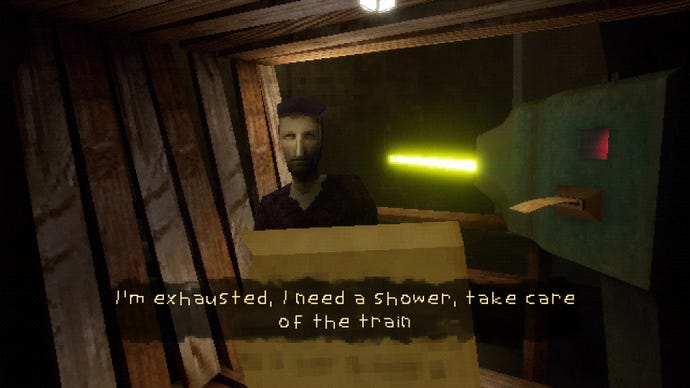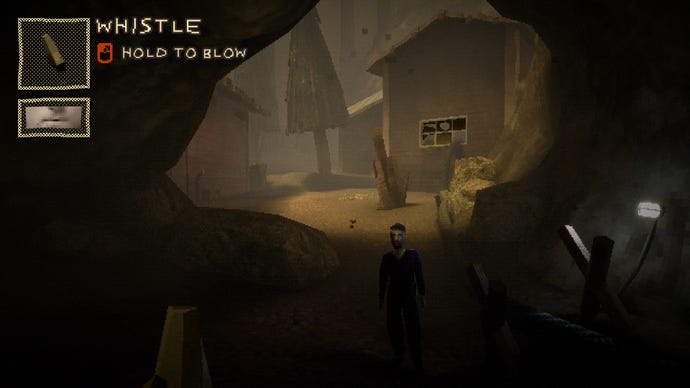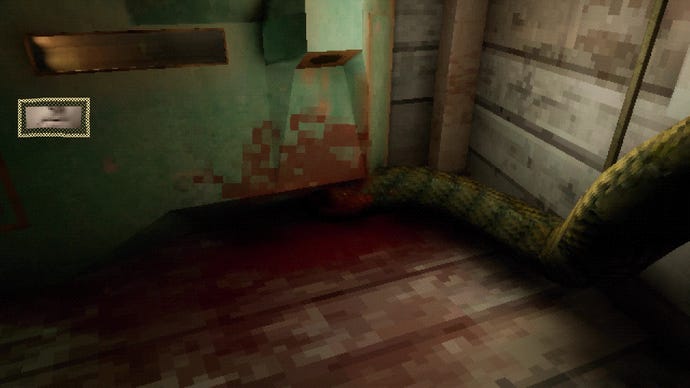My time with Threshold has been fraught with pain. Five times. Five times I had to restart this psychological horror game because of some game-breaking bug. And yet, I persevered, booting it back up and returning to my government-mandated shift atop a quiet mountain.
Ultimately, I gave Threshold chance after chance because I was totally taken by my shift and my immense desire to find out just what I was actually doing. Anyway, it’s time for me to clock off! I urge you to take over until I’m back. It’s worth it.
Much in the same vein as my Mouthwashing review, I’ll preface this one with a simple message that I’ll now deliver to you via an imaginary printer embedded in a grey, dingy wall. There’s a leaf of paper that judders out of it, with a “zzt, zzt, zzt”. A speaker in one corner of the room crackles to life and catches you off guard. It says, “I will refrain from talking about the story, because that would ruin things for you. Sign the agreement first and you may read ahead.”

Threshold’s story is told through a first-person perspective and begins in a small locker room. You’re instructed by a mysterious buzz from a speaker to collect your papers and to get to work. Mo’s shift has finished and you’re to take over from him. So you step into an elevator and it rises upwards with a rather haunting clang clang clang. All you know so far: 1) you can look around and click on highlighted objects, 2) you can cycle through your items with a scroll of the mouse wheel. Ominously, an oxygen metre poking out from the floor dips lower and lower as the elevator whirls upwards.
Eventually you’re deposited at the top of a mountain and Mo says hello. He doesn’t speak, though, instead hastily writing words on sheets of paper and handing them to you one by one. Oxygen levels are low, he says, hence preservation of every breath is crucial to working efficiently. Afterwards, he introduces you to the border post and your job within it…
A big freight train rumbles past and a row of lights sit above it. Your job is to keep the train running at the “expected pace”, which is very important, as it keeps the water level of the nearby stream running smoothly. If the train drops below the expected pace, the siren will sound and the lights will indicate what pace you need to hit. He hands you a whistle made of ivory, which is, weirdly, cold to the touch. You’re to stand at a little speaker opposite the train and blow this whistle into it, which commands the train to speed up with an ominous “thhhnnnggg” as the speaker’s back flap rises and clatters back into place.
The thing is, you’ve just forced a load of air out of your lungs and you’re now on the brink of death – oh. Mo remains calm and hands you an air capsule shaped like a tube. You’re to bite down on it to inhale some sweet, sweet O2. What he doesn’t tell you is the tube is made of fragile glass and it shatters in your mouth, causing you to hack blood onto the dirt below. “We get used to it,” he says.

Next, he shows you where to grab tickets and how to redeem them at a little outbuilding. Pop the tickets in the machine and it’ll spit out air capsules, but only when the train is running at the expected pace. He then leaves you to keep the train running, confident in your abilities. He doesn’t mention building two, which you walked past earlier and is conspicuously locked. He doesn’t mention the suspicious mound of dirt next to the ticket machine. Or the blood stains behind the big box. He doesn’t mention what’s in the train.
From here on out, Threshold is a semi-linear story in the sense that you discover things (horrors) about the bitesize border post as you explore. And depending on what you discover and how you interact with these things, you’ll fulfil certain conditions that mean you’ll trigger the next bit of the story, and so on. I’ve only discovered one ending and I’m told that there’s a true one and a bad one, too.
Again, I have to remain tightlipped here, but I find Threshold’s little border post universe weirdly believable. It’s comical, the way you take over from Mo without question and tend to a train by blowing into a whistle as your lungs verge on collapse. And it’s compelling, in the way you’re sucked into the rhythm of your work and the balance you must strike between haste and managing your oxygen levels – I can’t tell you how absorbed I was in my silly, stressful little job.
Getting your job wrong means running out of air, though, and if that happens: you’ll die. Keel over and you’ll need to restart your shift from scratch, but if you’ve secured a rare checkpoint you can start from around midway through the game. Although if you do re-load from a checkpoint, it can be difficult to know exactly where you’re at when it comes to the conditions you’ve fulfilled previously and what you’re meant to do next.

Still, the oxygen grind isn’t like your typical survival game nonsense, so it’s rarely frustrating. And the monotony of your routine doesn’t get boring, in the sense that as you discover objects and how they might interact with things, your routine might ‘change’, both in terms of the story and things-you’re-doing-wise. And these changes were more than interesting enough to help me march through at least five restarted playthroughs. I was desperate to know how things shook out (I’m sure by release they’ve ironed out the bugs that plagued me).
As the horrors unfold and you learn more about the post, Threshold’s commentary becomes clearer. It’s about wilful ignorance and excess and preservation at all costs. And about how one’s work can feel vitally important, even if you know something’s up and your place within it disposable. Of all the horror games I’ve played, I think this one will stick in my memory as short, to the point, and wickedly immersive. So yeah, if you’re happy to take over my shift, I’d urge you to. I’ll actually be off now. Call me if you need anything, and keep the pace!